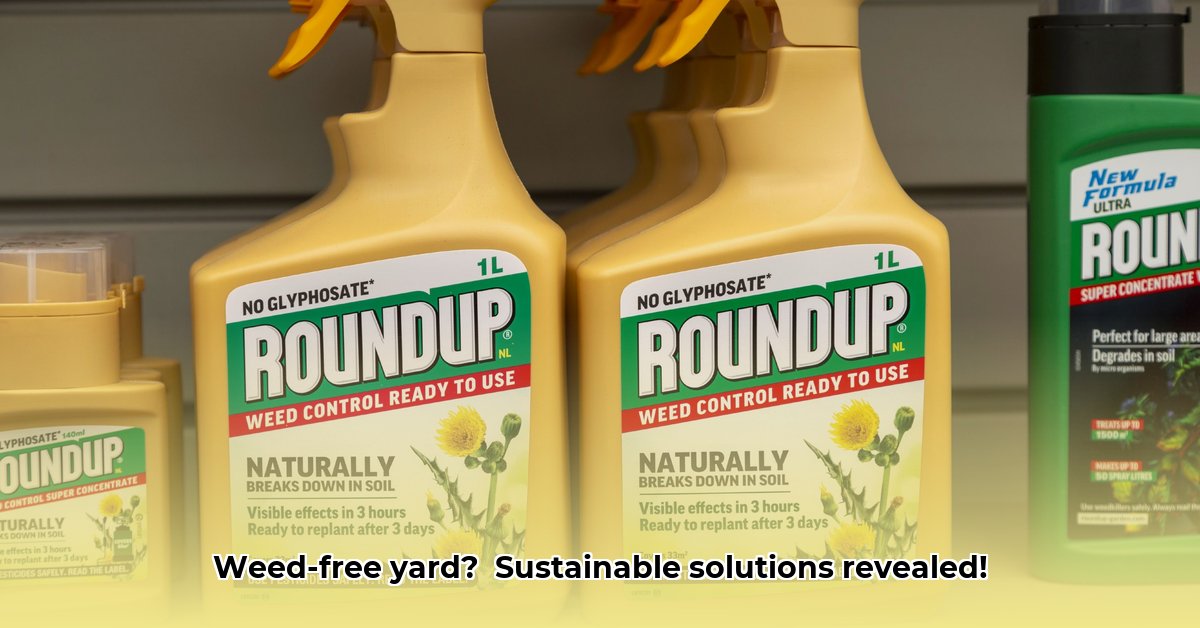
Many farmers rely on Roundup, readily available at Tractor Supply, for weed control. Its effectiveness is undeniable, but concerns about environmental impact and the development of herbicide-resistant weeds are driving a shift towards more sustainable practices. For more on sustainable farming supplies, check out Tractor Supply alternatives. This article explores the transition to sustainable weed management, examining alternatives to glyphosate, the active ingredient in Roundup, and the challenges and opportunities involved.
The Environmental Impact: A Delicate Balance
Roundup's efficacy stems from glyphosate, a broad-spectrum herbicide. While effective at controlling weeds, its widespread use has raised concerns about its impact on beneficial insects, soil microbes, and overall biodiversity. This isn't simply about aesthetics; healthy soil ecosystems are crucial for long-term agricultural productivity. Sustainable agriculture requires a more holistic approach, prioritizing the long-term health of the land alongside yield maximization. This shift necessitates exploration of alternative weed control methods.
Sustainable Alternatives: A Diversified Approach
Integrated Pest Management (IPM) offers a multifaceted solution. This holistic strategy combines several approaches:
- Mechanical methods: Tilling and cultivating physically remove weeds. While effective, these methods can be labor-intensive and may contribute to soil erosion.
- Biological control: Utilizing natural predators, such as insects or fungi that feed on specific weeds, offers a targeted, environmentally friendly approach. However, it requires careful planning and understanding of local ecosystems.
- Crop rotation: Alternating crops disrupts weed growth cycles, reducing weed pressure in subsequent seasons.
- Cover cropping: Planting crops between main crops competes with weeds for resources, suppressing their growth.
The optimal strategy depends on the specific crops, weeds, climate, and economic conditions. The transition involves investment in new knowledge and techniques, posing challenges for some farmers. However, the potential long-term benefits—healthier soil, resilient crops, and a reduced environmental impact—are compelling.
Roundup and the Future of Farming
Roundup's presence at Tractor Supply reflects current farming practices, but consumer demand for sustainably produced food is pushing a change. This broader shift requires collaboration: farmers adopting new methods, research institutions developing innovative solutions, agricultural companies offering sustainable products, and policymakers creating supportive policies.
Farmer Jones' Story: A Case Study in Transition
Farmer Jones, initially a Roundup user, witnessed the development of herbicide-resistant weeds. He transitioned to no-till farming and cover cropping, facing initial setbacks but ultimately achieving more sustainable and resilient agriculture. His experience demonstrates the challenges and rewards of adopting sustainable practices, highlighting the need for adaptation and learning. His successful transition serves as a model for other farmers facing similar challenges.
A Roadmap to Sustainable Weed Control
Farmers can implement sustainable weed management through a phased approach:
- Farm Assessment: Analyze weed types, crops, and farm characteristics to identify specific challenges.
- IPM Research: Explore various IPM techniques (mechanical, biological, etc.) using available resources.
- Combined Strategies: Utilize a multifaceted approach combining several techniques for optimal impact.
- Adaptive Management: Regularly evaluate effectiveness and adjust strategies based on observations.
- Continuous Learning: Stay updated on the latest research and best practices in sustainable agriculture.
Weighing the Trade-offs: Roundup vs. Sustainable Alternatives
| Feature | Roundup (Glyphosate) | Sustainable Alternatives |
|---|---|---|
| Effectiveness | High, broad-spectrum | Variable, depending on method and weed type |
| Ease of Use | Simple application | Can be labor-intensive, requiring specialized knowledge |
| Cost | Potentially lower short-term cost | Higher initial investment, potentially lower long-term cost |
| Environmental Impact | Potential negative impacts on soil health, biodiversity | Generally lower environmental impact |
This illustrates the need for considering all factors before choosing a method. The best strategy is context-specific.
How to Transition from Glyphosate to Sustainable Weed Management
The shift away from glyphosate is driven by environmental concerns and calls for healthier, more sustainable agriculture. The transition presents both challenges and opportunities.
Exploring Sustainable Alternatives
Several alternatives to glyphosate exist:
- Mechanical methods: Steam and electric weeding offer precise, environmentally friendly control but are expensive for large-scale operations.
- Biological controls: Natural predators offer long-term solutions but require specialized knowledge of local ecosystems.
- Non-toxic herbicides: These newer herbicides provide targeted control with reduced environmental impact, but their efficacy may vary depending on the weed species.
Choosing the Right Approach
Choosing the right approach requires considering:
- Specific Needs: Weed types, farm size, budget constraints.
- Environmental Impact: Water usage, energy consumption, biodiversity impacts.
- Cost-Effectiveness: Initial investment and long-term maintenance costs.
Navigating the Regulatory Landscape
Navigating the regulatory landscape for new herbicides can be challenging. Keeping updated on regulations and understanding labeling requirements is crucial for successful implementation.
A Sustainable Future
Transitioning to sustainable weed management requires planning, investment, and adaptation. It's a vital step toward a more environmentally responsible and resilient agricultural future. Each farm's specific context dictates the optimal strategy. This requires careful planning and a commitment to long-term sustainability.